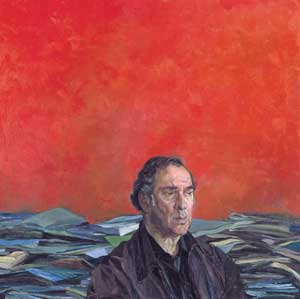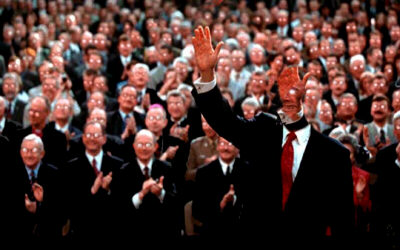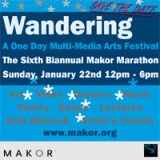 It is the ideology that underlies this 'split personality' that is the third, and most central, problem with your lecture: namely, your differentiation between ideas of truth as a writer and truth as a citizen. For a writer you say (or quote yourself in 1958 saying) that “A thing is not necessarily either true or false; it can be both true and false.” This statement, you now claim, is not the case for a citizen who must rather ask: “What is true? What is false?” As you point out, the context of truth in art is quite different from the context of truth in politics. However, in both fields, the status of truth is of the utmost importance. Despite the absolute truth being unattainable (“Truth in drama is forever elusive”) – in life, as in drama – as you point out, “the search is clearly what drives the endeavour.” Furthermore it is only through the critical engagement of artist, politician, audience or critic that “you stumble upon the truth in the dark.” One must take a stand on representations in both cases, because both artists and politicians continue to shape our world much as they did in 1958.
It is the ideology that underlies this 'split personality' that is the third, and most central, problem with your lecture: namely, your differentiation between ideas of truth as a writer and truth as a citizen. For a writer you say (or quote yourself in 1958 saying) that “A thing is not necessarily either true or false; it can be both true and false.” This statement, you now claim, is not the case for a citizen who must rather ask: “What is true? What is false?” As you point out, the context of truth in art is quite different from the context of truth in politics. However, in both fields, the status of truth is of the utmost importance. Despite the absolute truth being unattainable (“Truth in drama is forever elusive”) – in life, as in drama – as you point out, “the search is clearly what drives the endeavour.” Furthermore it is only through the critical engagement of artist, politician, audience or critic that “you stumble upon the truth in the dark.” One must take a stand on representations in both cases, because both artists and politicians continue to shape our world much as they did in 1958.
The distinction between a citizen and an artist, or at the very least an art critic, has become smaller, not greater, since 1958. You talk about the political rhetoric of “the people,” employed especially by leaders of the United States of America, and criticize that same “people” for being quiet in the face of those atrocities of the twentieth and twenty-first centuries carried out in its name. There are three reasons for their quietude: first, diminishing access to information as power is centralized and concealed; second, insulation from the results of the atrocities; third the dilution of the important information that is available by the vast river of mediatized information. Despite the anti-democratic tendencies of the first of these, the third, diluting effect, disguises the fact that more and more information is potentially available to the people in whose name UN Security Council policies are carried out, but that information is delivered in increasingly artistic ways. Yearning for a return to some objective truth in reporting, or some objective truth in understanding, is misguided because those sorts of truth never existed and never will exist: power distorts the truth in the hands of an author quite as much as it distorts it in the hands of an authority.
You discuss the disingenuous sale of the myth of American society: that the rhetoric of American openness and liberation is nothing but a cover for power-grabbing. This has an element of truth, but the politicians’ need for this myth shows that the American people as a whole do have a continuing belief in the “life and liberty” for which they fought against the global superpower nearly two hundred and thirty years ago. Myth can liberate as well as enslave. For example, the African American population in 1940, were as ready to fight for Nazi Germany as for the Allies. In order to convince recruits, the U.S. government commissioned the film series “Why We Fight,” which outlined the basic liberties and rights that Americans supposedly enjoyed and for which they were fighting. A generation later many of those recruits held the country accountable to those reasons stated in the films. It was a myth, indeed, but a myth that had meaningful, progressive political implications, because of the gap between what was said and what was done. If we talk fairly, we should act fairly. If we talk badly and act badly we can be held accountable. And if we talk fairly and act badly we are lying and should be held accountable for that.
Your argument, as I understand it, is with “the people,” especially those of the United States, for refusing to hold the government and the systems of representation, both political and informational, accountable for the ever-growing gap between presentation and reality. It is no accident that the term “representation” is used in artistic, political, and legal arenas. In each of those areas other people are elected to re-present us – to make us anew in the eyes of others. You argue that "the people" accept the two most important of these systems of representation -- democracy and 21st century media -- despite continuing and manifest betrayals.
 Given these ideas of art and citizenry, and your correlate claim that American citizens are failing in their civic responsibility, it comes as no surprise therefore, but rather as a delight, that you offered up Pablo Neruda’s poem and then a speech ostensibly for George W. Bush to deliver. The former is an implicit recognition that the language of art is unsurpassable for its evocation of a situation: for the articulation of the truth of a situation. The latter -- the staccato statements of belief that you place in the President’s mouth -- both assume and (because of the context and form in your lecture) defamiliarize the nature of the United States as “good” as “compassionate” as “democratically elected” as having “moral authority” as being “a great nation.” The “fist,” the “barbarian,” the childish opposition of the “good” and “bad” Gods, the juxtaposition of the modes of execution (“We don’t chop people’s heads off… We give compassionate electrocution and compassionate lethal injection”) all point to the discrepancy between the United States’ self-view and self-promotion in the world and its actual behaviour. This is a discrepancy for which someone should be held accountable.
Given these ideas of art and citizenry, and your correlate claim that American citizens are failing in their civic responsibility, it comes as no surprise therefore, but rather as a delight, that you offered up Pablo Neruda’s poem and then a speech ostensibly for George W. Bush to deliver. The former is an implicit recognition that the language of art is unsurpassable for its evocation of a situation: for the articulation of the truth of a situation. The latter -- the staccato statements of belief that you place in the President’s mouth -- both assume and (because of the context and form in your lecture) defamiliarize the nature of the United States as “good” as “compassionate” as “democratically elected” as having “moral authority” as being “a great nation.” The “fist,” the “barbarian,” the childish opposition of the “good” and “bad” Gods, the juxtaposition of the modes of execution (“We don’t chop people’s heads off… We give compassionate electrocution and compassionate lethal injection”) all point to the discrepancy between the United States’ self-view and self-promotion in the world and its actual behaviour. This is a discrepancy for which someone should be held accountable.
However, when you say that “political language does not venture” into the territory of your art because it is “interested not in truth but in power and the maintenance of that power,” you are placing unnecessary limitations on the capabilities of art, and the way they may be co-opted. In fact, politics has long wandered in the wilderness of art, ruthlessly appropriating strategies and half-truths that it can use for its own ends. The spurious direct link between Iraq and Al Qaeda which you refer to in your speech as being presented as truth is an example of this. Saddam and Al Qaeda are indeed related to one another as perhaps the Labour Party in the UK and the Republican Party in the USA are related to one another – they are in related fields though with largely opposing stances. Constant association through repetition – a strategy that you yourself use to great effect in The Birthday Party amongst other occasions – leads to the assumption of a link and begging of the question. Art, the artists who produce it, and the public who consume, participate in, and question it must hold many truths, fictions, and falsehoods at the same time before making their tentative conclusions in good faith. Belief in one true way is the fundamentalist mode against which you argue. Your argument is not for truth but for integrity: not for faith but for critical acumen. The scandal of the invasion of Iraq was not the truth of the situation but the deliberate misleading of the people by the leaders. The sine qua non for reading literature and viewing art is the critical engagement with the piece – what is there, how it is portrayed, and what is not there. It is exactly this lack of critical engagement, sharpened and practised in the realm of art, that is missing from the people.



A Parable after my hard drive crashed
Zalman Schachter-Shalomi
Christmas in Jerusalem
Jay Michaelson
Carobs
Elisha Porat
Dear Mr. Pinter
Dan Friedman
The Nuclear Physicist Gives his Son a Haircut
Hanan Harchol
Brodsky Begins, Part Two
Adam Mansbach
Archive
Our 870 Back Pages
Zeek in Print
Subscribe now!

About Zeek
Mailing List
Contact Us
Subscribe
Tech Support
Links

From previous issues:
Skepticism Does Not Exist
Treasure
Driving
Jay Michaelson
Ron Mohring
Julia Glassman